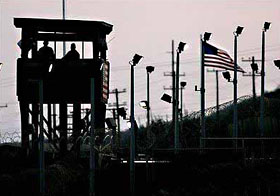Dafna Linzer at ProPublica reported yesterday that President Obama may be planning to challenge a provision in a military spending bill that makes it harder for him to shut down Guantanamo and transfer its prisoners elsewhere. This will be an  interesting confrontation, but it’s also a bit of a sideshow: the prisoners themselves, after all, have no real reason to care whether they’re held forever in Cuba or Michigan. But that’s pretty much what Obama intends to do. Amos Guiora and Laurie Blank take him to task for this in the LA Times today:
interesting confrontation, but it’s also a bit of a sideshow: the prisoners themselves, after all, have no real reason to care whether they’re held forever in Cuba or Michigan. But that’s pretty much what Obama intends to do. Amos Guiora and Laurie Blank take him to task for this in the LA Times today:
The Obama administration now intends to issue an executive order establishing indefinite detention without trial for detainees at Guantanamo Bay. This decision will formalize this violation of basic rights. Denying individual accountability will now be official U.S. policy and law.
….Those who argue that indefinite detention accords with the treatment of prisoners of war gloss over two key distinctions: POWs are held in protective custody and released at the end of hostilities, whereas post-9/11 detainees are held in de facto punitive detention and terrorism has no end to trigger release. Those who want to argue that we are at war with Al Qaeda and other terrorists fail to consider that the law of war and principles of morality in armed conflict do not countenance such an approach, where detainees face the prospect of generational, even lifetime, detention without charge or trial.
Indefinite detention completely undermines the basic notion of individual accountability, thus constituting a fundamental miscarriage of justice. The United States, uncertain whether the detainees are criminals or more akin to fighters in an armed conflict, must still grant them the basic right to a day in court. Without that, individual accountability is simply eliminated, effectively saying that the adjudication of individual liability is burdensome, perhaps even irrelevant.
A few days ago Adam Serwer wrote a pretty balanced explanation of Obama’s plan, which you should read if you want to understand the details. But I sometimes wonder how much any of this matters in practice. After all, what happens to these detainees if they get a trial and are found not guilty? It would be political suicide to release them within the United States, and no president would ever try. But what other country would take them? For the vast majority of these detainees, my guess is: none of them. So even if they got a full and fair trial, and some of them failed to be convicted, they’d end up staying in prison anyway. It would be called something else, and possibly they’d be allowed more privileges than other detainees, but the odds are that they’d be locked up nonetheless.
I’m not making an argument for indefinite detention here. I’m just wondering what, in practice, happens if we eliminate it and give everyone trials. Would anything really change?

















